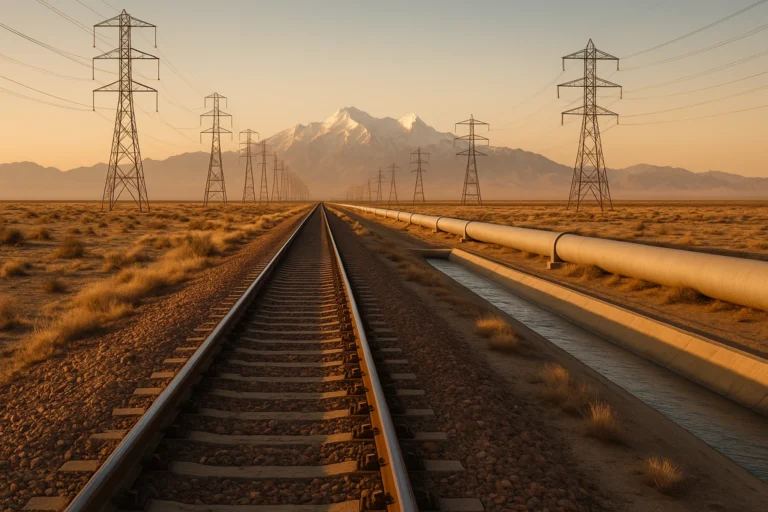
What does a fresh injection of investment and expertise from British oil major BP mean for Azerbaijan’s energy sector and its political leverage in the region?
A New Prospect for Azerbaijan’s Energy Sector
A pivotal shift is taking shape in the Azerbaijani sector of the Caspian Sea, as BP sets its sights on entering the Karabakh oil field development project by the end of 2025. This follows a memorandum of understanding (MoU) signed in September 2024 between BP and SOCAR (the State Oil Company of Azerbaijan Republic) that also covers the Dan Ulduzu-Ashrafi-Aypara offshore structure. Although discussions are ongoing, BP’s Vice President for the Caspian region, Bakhtiyar Aslanbayli, has expressed optimism that the final deal could be sealed as early as this year.
The Karabakh Field’s Strategic Significance
The Karabakh oil field itself is situated roughly 120 kilometers east of Baku, near the historically prolific Caspian Guneshli field. With water depths varying from 150 to 200 meters, Karabakh could tap into reservoirs that significantly bolster Azerbaijan’s standing as a key energy supplier. Both BP and SOCAR aim to finalize their negotiations quickly, ensuring the project maintains momentum.
This development gains further importance in light of Azerbaijan’s broader offshore ambitions. The Caspian Sea, known for its vast petroleum reserves, remains central to the country’s energy policy. Having successfully expanded its export routes through pipelines like the Baku-Tbilisi-Ceyhan (BTC), Azerbaijan is now seeking new partnerships to enhance production capacity. BP’s anticipated arrival would introduce substantial foreign investment and advanced offshore technologies—factors that could accelerate exploration efforts and reduce operational costs.
Political Implications
Politically, BP’s entry represents a strategic boon for Azerbaijan. By collaborating with a major British corporation, Azerbaijan reinforces its image as a stable and significant energy producer in a region marked by shifting alliances. The partnership could strengthen diplomatic ties with the United Kingdom, potentially extending into trade agreements and broader forms of commercial cooperation.
Simultaneously, other regional players may reassess their strategies. As Azerbaijan’s influence grows, neighboring nations might seek alternative alliances or vie for their own stake in the Caspian’s offshore reserves. Environmental and governance considerations may also arise, but Azerbaijan’s consistent efforts to attract foreign partners suggest it sees international collaborations as a way to modernize and uphold industry standards.
Economic Implications
Economically, the Karabakh field could infuse Azerbaijan’s hydrocarbon sector with significant new capital. Exploration and production activities often generate demand for numerous ancillary services, including maritime logistics, engineering, and advanced seismic analysis. Major oilfield service providers—such as Halliburton, Schlumberger, and Baker Hughes—stand to gain from contracts tied to drilling and infrastructure development. Local maritime transport companies and port operators may also see an upswing in business as they support increased offshore activity.
On the flip side, the focus on large-scale hydrocarbon initiatives might temporarily overshadow renewable energy projects. While global shifts in energy demand lean toward clean sources, oil remains integral to many economies, and BP’s interest underscores that Azerbaijan’s petroleum sector is far from tapped out. However, if Azerbaijan manages these revenues effectively, it could eventually channel a portion of the profits into diversifying its energy mix.
Sectors and Companies Poised to Benefit
In the short term, offshore drilling equipment manufacturers and specialized maritime construction firms could experience a surge in orders. BP’s presence often attracts a network of international suppliers and local subcontractors. Port services, shipping companies, and logistics providers around Baku may win lucrative contracts for supporting the field’s operational needs.
Companies like Halliburton, Schlumberger, and Baker Hughes could see increases in demand for drilling technologies, while infrastructure-focused firms such as McDermott or local Azerbaijani construction companies may be brought in to build or service offshore platforms. Concurrently, renewable energy developers, like Masdar—which has pursued wind projects in Azerbaijan—may find it harder to compete for immediate government attention and funding if the public focus shifts heavily toward oil revenues.
Impacts and Outlook
If BP formalizes its entry by the end of 2025, exploration efforts at Karabakh could move into advanced stages far sooner. Over the medium to long term, a successful and productive Karabakh field would likely boost Azerbaijan’s public finances, funding infrastructure improvements and potentially strengthening the country’s hand in international negotiations. This can also foster deeper ties between Azerbaijan and the United Kingdom, with energy partnerships often translating into broader diplomatic and commercial engagements.
Still, questions linger about whether global transitions toward sustainable energy might eventually curb demand for Caspian oil. For now, however, geopolitical complexities and market realities suggest hydrocarbon development will remain economically viable for years to come. BP, which has already shown interest in renewable projects globally, could also help Azerbaijan adopt industry best practices, potentially paving the way for a balanced approach to energy development.





